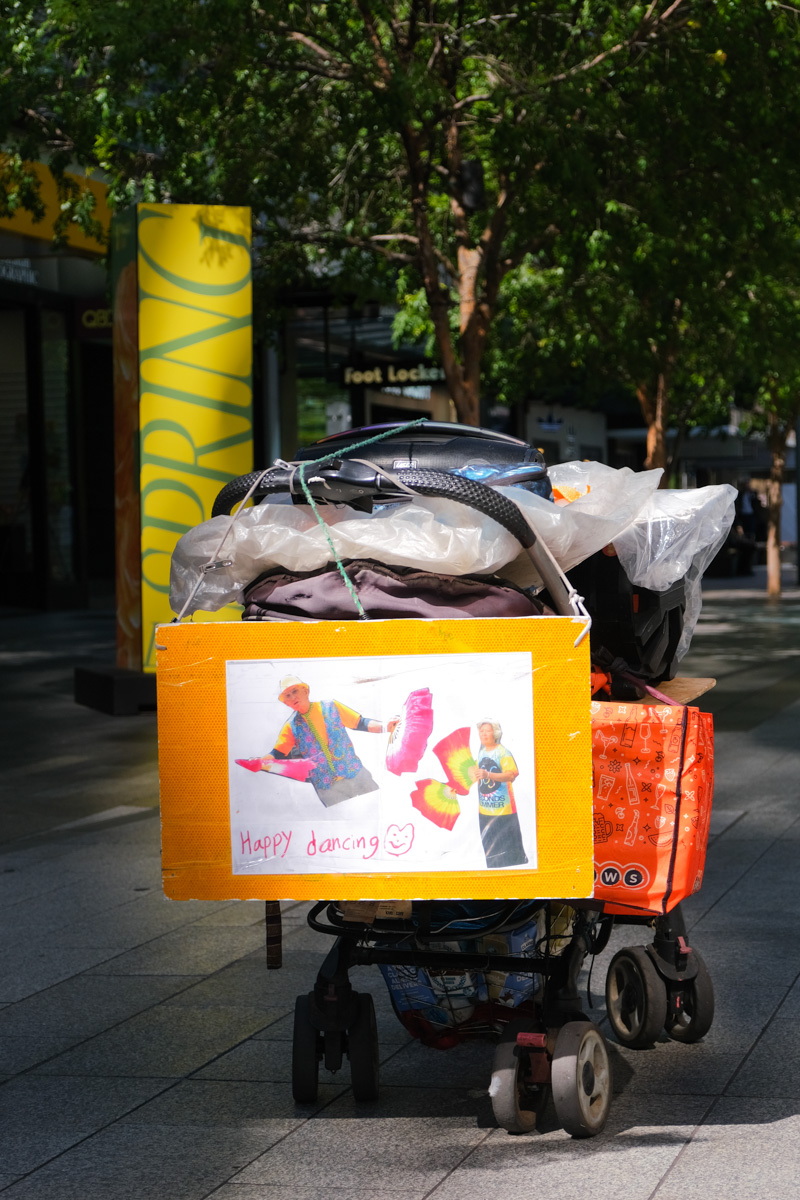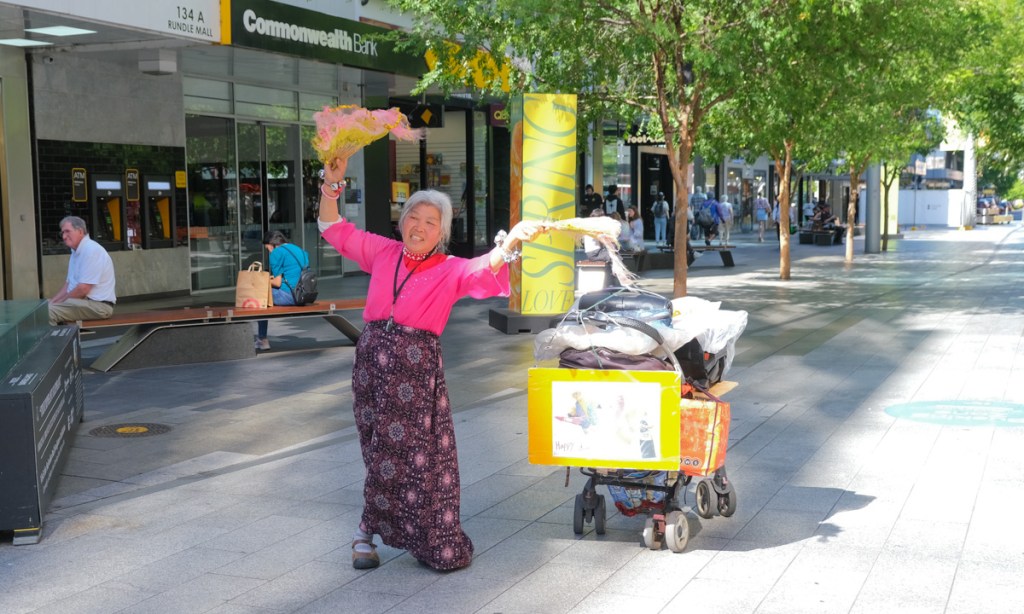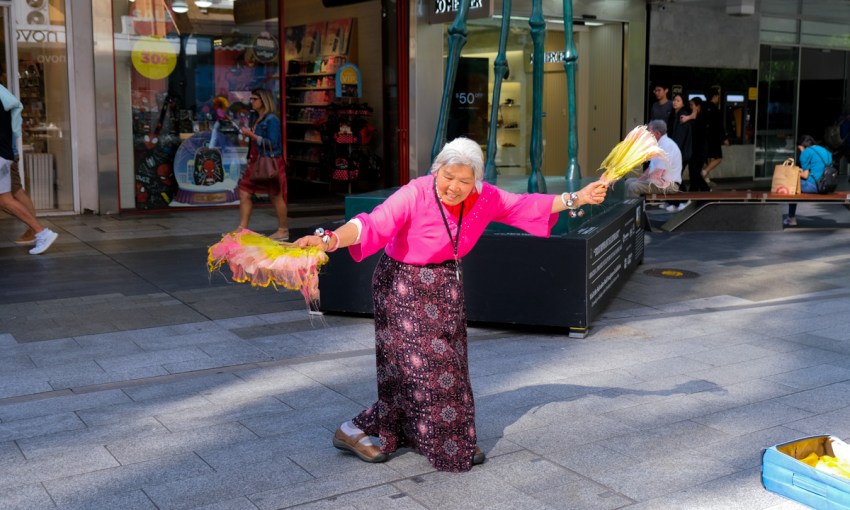In the second in our series of getting to know private people behind the public facade, CityMag sits down to hear the story of Rundle Mall's colourful dancing busker, Bobo.
Who is: Bobo?
Anyone who hits Rundle Mall for their lunch break, a shopping spree or a shift at one of the local retailers, has seen Adelaide’s dancing queen, Bobo.
Bobo has been dancing in the Mall since 2017, first with her husband and dancing partner, Max Gordge, and then alone after he died in 2019. That is normally where her story ends: dancing in the memory of her husband. But CityMag learned in conversation with Bobo, that there is so much more to say about this much-loved human of Adelaide.
When first approaching Bobo about writing a story on her life, it became clear there would be a language barrier.
“I’m a journalist, and I’d like to write a story on you.”
“Okay, thank you!” Bobo says with an earnest smile.
“Can I interview you sometime this week?”
“Okay, thank you!” Bobo says.
A week later, CityMag wandered into Rundle Mall with a translation app in hand, looking for Bobo. She later told CityMag that she was taking classes to learn English.
“I don’t understand English at all, so if I want to listen to others, I have to learn it,” Bobo says.
The day was fighting its fate of rain, with looming grey clouds and a cold breeze that had most striding toward the nearest heater. Nevertheless, there Bobo was performing in the Mall with her Chinese fans that look like a bouquet of yellow-stemmed flowers topped with fraying pink florals.
As people passed, Bobo bowed towards them, saying “morning” to those who came close and “thank you” to anyone who nodded or smiled her way. Her warmth and kindness stood out as much as her bright outfits do against the grey paving stones of Rundle Mall.

While organising the settings of the translation app from English to Cantonese, the sound of exclaimed greetings in another language echoed through the Mall. Bobo was conversing with two women in Cantonese. We sighed with relief.
These two women, who appear to be mother and daughter, translated to Bobo that CityMag would like to write a story about her. Bobo seemed surprised but agrees, and the women offer to translate for a few minutes before leaving for an appointment.
During this time, CityMag becomes sceptical they are translating everything Bobo says. Thirty seconds of speech appears to be three words in English. Nevertheless, a few details about Bobo’s life become clear.
Bobo met her late husband Max through a friend of her daughter’s while visiting Australia. The pair hit it off and Max later visited Bobo in her hometown of Guangzhou, China. The couple fell in love, decided to get married and Bobo officially moved to Australia in 2017.
“How did Bobo and Max communicate, given the language barrier?”
All three ladies chuckle, with a back-and-forth of what CityMag can only imagine are great quips we’re missing out on.
“Body language,” the mother says with a knowing grin.
Beside Bobo at every performance is a small blue carry-on suitcase for donations and a stroller packed to the brim with her belongings; a speaker, shopping bags, a tarp for when it rains, a worn children’s pram toy and, of course, her white cardboard sign hanging from the stroller’s handle. It’s this sign, accompanied by a picture of Max, is how most of Adelaide knows her story.
“You will be always in our heart dear Max. Your Bobo will be keeping on dancing as you would bringing joy to everyone.”
As Bobo and CityMag chat at the edge of the Mall, seeking cover from the rain, many walk by and glance at us curiously, with one onlooker saying “Hello Bobo!”.
Despite the message on the sign, CityMag asks Bobo why she decided to continue dancing following Max’s passing.
“Because I want to live. If I don’t dance at my age, I can’t live,” Bobo says.
Confused by this answer CityMag asks “How do you spend your days outside of dancing, Bobo?”
The translation app voices this question to her and she replies in Cantonese. As her translated words appear on the dim-lit phone screen, it becomes clear Bobo’s life isn’t as bright as we once thought.
“I don’t have much to spend, because I dance for a living now,” Bobo says.
Although optimistic, CityMag wondered if dancing had always been something Bobo was passionate about. Was this a lifetime dream worth the financial difficulty?
“What did you dream for yourself as a child?” we ask.
Bobo softly smiled at this question and paused with a familiar “mhmm”.
“When I was young, I hoped that I would have a happy, beautiful family. But my wish could not be realised,” she says.
Bobo had told CityMag earlier that she has four children and nine grandchildren from her first marriage, so this was an unexpected answer.
“How was this not realised?” CityMag asks.
“Because they all have their own homes and their own difficulties, people of my age should understand and not drag them down,” Bobo says.
As a flurry of city workers fills the Mall during lunchbreak, a young gentleman, who we’ll call “The Banker”, approaches CityMag offering to translate.
He wastes no time and continues from Bobo’s last words.
“I know that I must be strong if I want to survive. Although Max is dead, I need to live on,” Bobo says.
Tears begin to stream down Bobo’s reddened cheeks as she shares how she wishes not to be a burden on her family.

The Banker explains that while two of her children live in Australia, Bobo knows they too have been facing their own difficulties, from adjusting to life post-migration and raising their own children, to dealing with divorce.
“So, she wants to earn the savings, the pocket money by herself. She doesn’t want to ask money from her family (sic). She wants to keep what her husband liked to do – bring joy and happiness to everyone,” The Banker says.
Bobo is now 70, and while that clearly has never impacted her passion to busk in the mall, she tells us that when she applied for work, no one would hire her because of her age. She had to find other means.
“She used to get some bottles and cans to sell, but before there was someone to help her to collect the bottles. Her friend went to Melbourne, so now she is alone here in Adelaide. Not much (sic) friends. And the only way she can get money is by dancing,” The Banker continues to translate.
“Is it enough?”
The Banker asks Bobo and repeats her words back.
“In Australia, even if you have some money, you can just survive,” The Banker says, quoting Bobo.
“She is paying $130 a week for her rental. She has normally $30 left, enough for one week of groceries.”
Max and Bobo were experiencing financial difficulty for a time and so busking became a way the pair could survive while doing good.
“When her husband went to Guangzhou in China, to meet with her, he saw someone dancing on the street. The feeling is very happy (sic),” The Banker says.
“Performing on the street can in the first case, earn some money, second is reduce stress and bring joy to everyone and make their life better quality. Living a meaningful life and sharing all the happiness with everyone helps them a lot,” he says.
Thirty minutes later, The Banker’s lunch break is over and he’s yelling back “happy to help!” as he runs to make the pedestrian lights on the corner of Pulteney and Rundle Mall.
As our interview comes to an end, Bobo adds that she feels relief in being able to share the reality of her life with someone.
“I am not unhappy. Sometimes what I want to say is what I can’t tell others, because I can’t speak English, so I can’t tell others it’s me who is feeling bitter. I told you and after I told you, my heart was relieved,” she says.
“In fact, when I came here, I felt that the people here are very friendly. Although I encountered many difficulties, many people were very enthusiastic to help me, so I will continue to stay here.”




